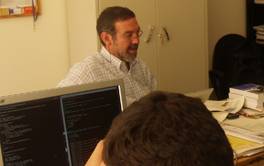LIAAD participates in KDubiq
João Gama, researcher from LIAAD - INESC Porto LA (Laboratory of Artificial Intelligence and Decision Support), participates in KDubiq project - Knowledge Discovery in Ubiquitous Environments. This is the first Coordination Action for the Ubiquitous Extraction of Knowledge.
20th October 2007
This action is financed by the European Community in the context of the IST program (Information Society Technology) - FET Open (Future and Emerging Technologies). The project started in December 2005 and will end in May 2008.
This project's mission consists of identifying new problems and challenges on the intersection between mobile and distributed systems and advanced techniques for knowledge extraction, supporting and promoting activities in every area related to this theme.
KDubiq intends to find new research opportunities in several representations, spatio-temporal distributions, multimodals, as well as problems related to safety and privacy. KDubiq also aims at defining strategic lines and stimulating ideas for long-term research. At the same time, the intention is to identify, contact and connect subjects which can contribute to the multiple aspects of ubiquitous Data Mining.
KDubiq not only intends to identify and promote new emergent technologies and innovative applications, but also create a forum for university students, for the industry and for the public sector. This will promote cooperation and research opportunities.
This project is opened to every person and institution interested in this matter. Currently, there are more that 7 companies, universities and research institutions involved in this project, as well as more than 400 researchers. For more information on this project go to <http://www.kdubiq.org/ >
KDubiq project is divided into six work groups: WH1 - Applications in the areas of mobile Data Mining, sensor networks, invisible technology, mobile wireless networks, etc; WG2 - Ubiquitous Technologies: distributed technologies, grid computation, P2P; WG3 - distributed learning algorithms and limited resources; WG4 - Semantic Web, networks and heterogeneous data, audio and video, ontology, spatio-temporal Data Mining; WG5 - privacy and Data Mining; safety and legal aspects; and WG6 - interface, user profiles, cognitive modelling, visual Data Mining.
This project's next iniciative will be the 2nd European Summer School on Knowledge for Ubiquitous Computing that will take place at the University of Porto in March 2008.
The idea is to spread the word on the KDubiq project, to promote research on this theme and to train researchers for a future research community. For more information, go to http://wiki.kdubiq.org/summerschool2008/index.php/Main/Home
BIP, October 2007


